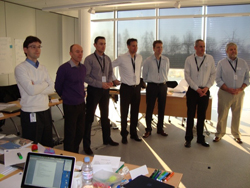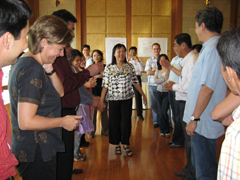Facilitation of learning processes
 To put it simply, facilitation is enabling groups to succeed. Facilitating learning is supporting an individual or group during a learning process; a learning facilitator guides his or her learners through a learning experience by doing it with them and not for them. A learning facilitator is focused on the learner and not on him or herself and the content.
To put it simply, facilitation is enabling groups to succeed. Facilitating learning is supporting an individual or group during a learning process; a learning facilitator guides his or her learners through a learning experience by doing it with them and not for them. A learning facilitator is focused on the learner and not on him or herself and the content.
Learning approaches
We use different learning approaches while facilitating learning processes. The most commonly used are:
- Classroom based learning: learning requires face-to-face interaction between group and facilitator (e.g. discussion, role play, simulation, coaching, action learning)
- Distance learning: learning can occur in any location without extensive face-to-face contact with the tutor/facilitator or learning peers; can be based on printed material or electronic media (internet) with full tutorial support
- Independent or self study: the learner is able to facilitate his/her own learning with little or no input from the tutor/facilitator; this can be beneficial when the learner needs or wants to work at his/her own pace
- On-the-job learning: immediate application of learning to improve performance is a priority; when the organization is equipped for learning (e.g., trained trainers/coaches/mentors, opportunity to practice skills, materials and space)
- Blended learning: learning objectives vary widely and are best facilitated by a variety of approaches that can efficiently use existing systems and resources; a combination of two or more of the above approaches

Examples of ‘Facilitation’ projects include:
- Facilitation of Train the Trainer workshops and trainings using a classroom based approach
- Facilitation of Protection Learning Programme, a blended learning programme including a self-study phase through e-learning and facilitation, a workshop and coaching at a distance
- Team events and workshops for shared vision, team building and other purposes by using a classroom based approach
Resources and Tools
Providing Feedback Online - Alberink, B. (2011)
Useful Group Facilitation Techniques, a practical overview - Alberink, B. and Giorgi, J. (in progress)

